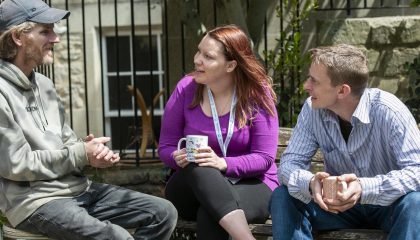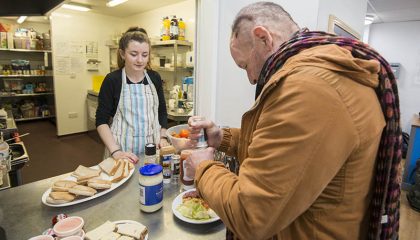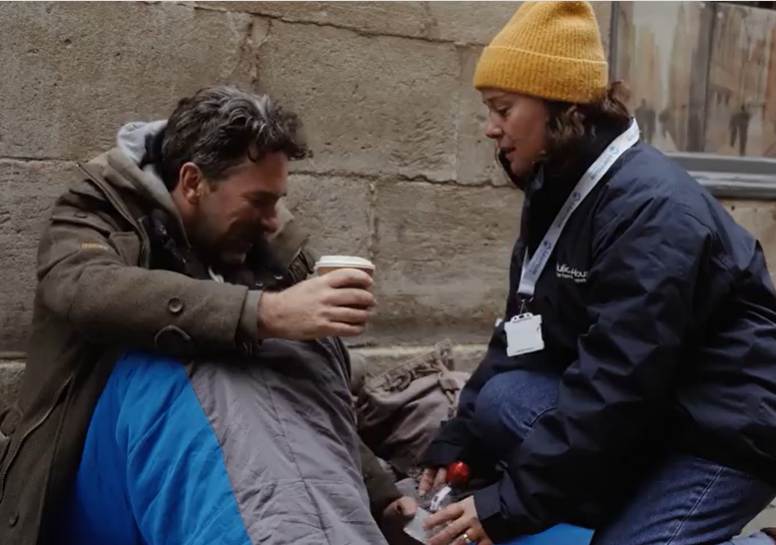
Like many marginalised groups, the relationship between homelessness and mental health can be two-way – many rough sleepers cite mental health as a reason for becoming homeless and, for many, mental health can be the main reason for the challenges which stops them from getting off the streets.
Our Assertive Outreach team is a collaborative team, working with other organisations to get clients the mental health support they need. We spoke to Kerry Mellor, the team leader for our Dorset team, to find out why it is so important.
Why do you think it’s important to have a mental health specialist on outreach?
Street outreach is so important for making contact with people who are not able to access mainstream services. Many of our clients are not able to keep to appointments or get themselves to a building-based service, so we get to know what they want and need and make sure they have access to all relevant support.
What sorts of things can you support clients with?
As well as practical support, such as making homelessness applications, sorting problems with benefits or setting up health appointments, a big part of our work is building up trusting relationships with people who have become stuck in a street lifestyle. The people we work with often face both external barriers – systems that are overly bureaucratic or can’t cope with people who present with high support needs, for example – and internal barriers, whereby, usually through traumatic life experiences, they find it difficult to relate to other people in a healthy way or have behaviours that get them excluded from society, or choose to stay separate themselves.
What does a typical day look like?
For an outreach worker, the day will often start at 6am with a street outreach session. This might be quite local to our base in Weymouth, where we usually walk round the area, making contact with people sleeping out in the town centre, Esplanade or local parks etc. We cover the whole of the Dorset Council area so the shift might involve driving out to West Moors, where we have a client camping out in a remote spot, or to similar spots in Purbeck, Lyme Regis or Gillingham. Wherever we have existing clients, or new referrals, we will get out there so sometimes we’re in the towns and, at other points, tramping through forests, fields or beaches. Outreach can finish any time from 9am to 12pm. During the rest of the day we visit clients, do follow up work (referrals, phone calls, liaison with other agencies etc) and, of course record all that we do on our database. We develop support plans with all our clients so that there is an appropriate action plan for everyone in the service.
What are some of the most common things you see clients struggling with?
Many people are struggling with addiction to drugs and/or alcohol and mental health problems. As I mentioned before, these tend to be a symptom of a traumatic history but are often the things that people notice first and have a massively negative impact on people’s lives, but are just the symptom of having to try and keep themselves safe in what has frequently been a hostile world for them. Some of the difficult behaviours and substance use are coping mechanisms that are not serving people well in the long term but were pretty reasonable responses to an initial unsafe situation.
Which other agencies do you work with?
We are one piece in a jigsaw of services for homeless people in the area. These include the Homeless Health Team – a physical health nurse and mental health practitioner who will come out with us on shift to make contact with people, the Reach Out project – who provide substance use interventions for homeless people; then a whole list of agencies that run accommodation or advice projects, such as Lantern Trust, Shelter, FirstPoint, BCHA, the Bus Shelter. The Community Safety team are also a valuable link as they have a street presence throughout the day. Finally, statutory services such as the Police and Local authority Housing team. This list is far from exhaustive and we try to keep good communication going with various local foodbanks and agencies across the county so they know who to come to if someone presents to them who is sleeping rough and, likewise, we can refer people to them for food and support with basic needs.
You can find out more about our outreach services here.
And if you would like to support the work we do, please consider making a donation here.






